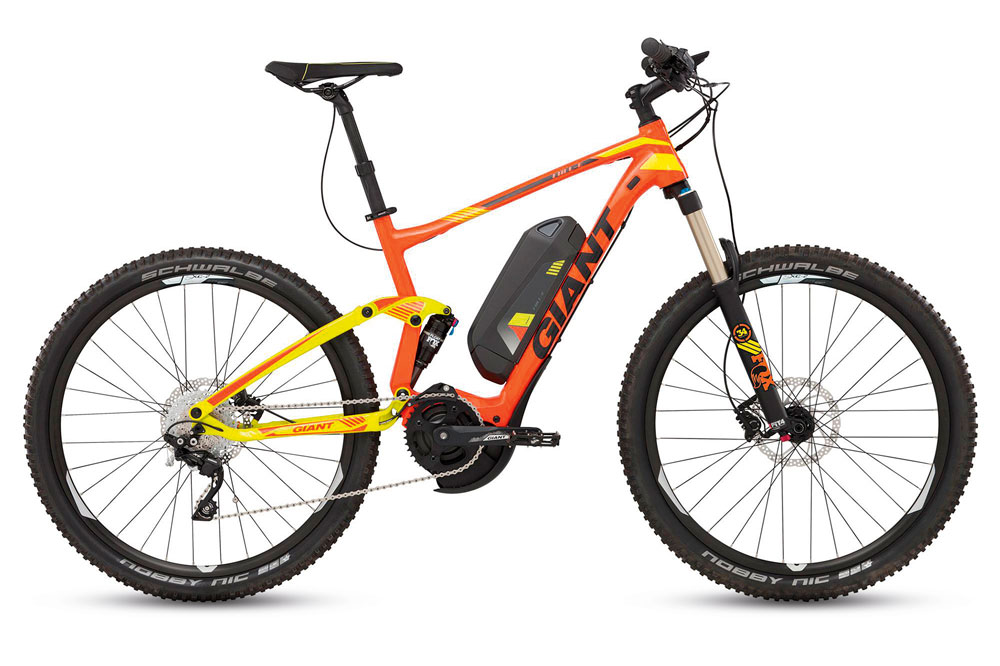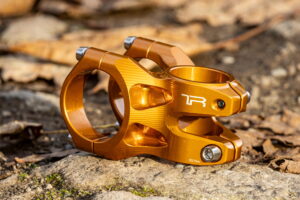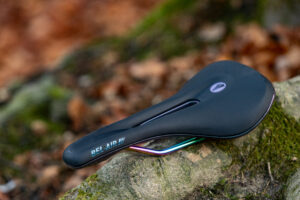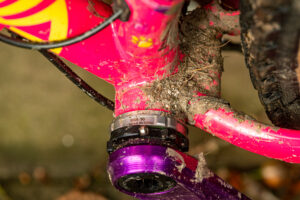As it stands, the Full E+ 1 is more of a towpath power-house than a genuine singletrack slayer. It wouldn’t take much to bolster the Giant’s rating though.
Giant Full E+ 1 (2016) review
There are two 130mm travel full-suspension e-bikes in the Giant range and both come under the Full E+ banner. The E+ 1, tested here, is the flagship model, but for £600 less the E+ 2 uses exactly the same frame and SyncDrive Yamaha X94 motor, but gets a more affordable build kit.
>>> The best electric mountain bikes
Clever as Giant’s Full E+ nomenclature is, it’s also a little confusing, as the bikes don’t actually have Plus size tyres. Instead, they roll on regular 27.5in wheels shod with Schwalbe 2.35in rubber.

Given that ultra-wide rims and big fat Plus tyres add roughly 1kg to the combined weight of the wheels, it’s hardly surprising that the Full E+ 1 is the ‘lightest’ bike in this test, even though it’s also the cheapest.
In a departure from Giant’s signature Maestro twin-link suspension, the Full E+ 1 gets a simplified single pivot design. Giant has dubbed this the SmartLink and it benefits from Giant’s co-pivot design, where the shock and main pivot share the same mounting hardware to reduce both weight and cost.
Suspension
In terms of travel, the Specialized and Giant are closely matched. Both are rocking 140mm forks, and with 130mm out back, the Giant is only 5mm shy of the Specialized.

SmartLink suspension: supple and matched up well to the Fox fork
Up front, the Fox 34’s ability to smooth out the bumps puts it well ahead of the RockShox Yari on the Specialized.
It’s a similar story with the rear suspension too. The SmartLink design on the Giant felt incredibly supple off the top, with a nice smooth progressive rate through the stroke so you don’t blow through the 130mm travel on drops or jumps.
Components
After riding the two Plus bikes, the regular 2.35in Nobby Nic tyres on the Giant felt really skinny. They also brought home what most Plus size tyres lack — proper side knobs to load on off-cambers and corners.
Giant has gone with a softer Trailstar compound up front and harder wearing PaceStar rubber on the rear. Sound thinking for non-electric assist bikes, but given that rear wheel traction is often the limiting factor on an e-bike, softer rubber front and rear would make more sense. We’d also like to see Schwalbe’s tougher Super Gravity casing on the rear for extra pinch-flat protection.

Square taper peg in a round hole world: Giant needs a re-think
The real limiting factor on the Giant, however, is the lack of gear range due to the 10-speed 11-36t cassette. So even with the Yamaha motor set to maximum power, long, steep climbs proved to be a slog.
Performance
We have an admission to make. When the Giant first arrived we couldn’t figure out how to switch it on. We pressed the button on the battery, no joy. We held the mode switch down for various lengths of time, still no joy. We even tried prodding the display, hoping that the Full E+ 1 would somehow spark to life… it wasn’t to be.
In the end, we sheepishly picked up the phone and called Giant UK. It turns out that the power button is smaller than a pimple and hidden on the side of the remote.

Yamaha motor dishes out seamless power at almost any cadence
Once running, there’s no denying that the SyncDrive Yamaha motor delivers almost seamless pedal assistance at any cadence, but we quickly discovered that the Giant is hamstrung by more pressing old-world issues. Namely, the long stem, narrow bar and a size large frame that is way too short and overly tall.
It doesn’t help, either, that there are only two usable power modes on the SyncDrive Yamaha X94 motor. Yes, the display shows Eco, Normal and Sport modes, but Eco is akin to pedalling through treacle, and all but redundant. This feeds back into the limited gear range too, because even in Sport mode the motor doesn’t have the grunt needed to muscle this 22.08kg (48.7lb) bike up short, steep climbs.
A more pressing issue with the Yamaha motor, though, is that it uses an old square taper spindle; experience tells us that keeping the crank arms securely attached to the motor will definitely be an issue.
Motor

Seamless power delivery from motor
SyncDrive Yamaha X94 motor with four-sensor technology that combines speed and torque sensors with rotational sensors on the motor and crank, for seamless power delivery.
Display

The ‘control room’ in the cockpit
Giant Ride Control LCD centrally mounted on the handlebar, with remote control located near the grip, power mode selection and a LCD light button.
Power Modes
Eco, Normal, Sport
Battery

Battery needs to be removed for charging
Giant EnergyPak 500Wh. The battery needs to be removed from the bike to access the charging port, so whatever you do, don’t lose the keys!
>>> Buy Now: Giant Full E+ 1 at J E James

Verdict
It wouldn’t take much to bolster the Giant’s rating. A shorter stem, wider handlebar and some thicker casing tyres would be all it would take. If, however, Giant wants to turbo charge the Full E+ 1 and compete with the likes of Specialized and Trek, it’s going to need a compete overhaul. The length of the frame needs to be increased, the gear range needs expanding and that old square taper crank spindle on the Yamaha motor really needs to be put back in the museum. As it stands, the Full E+ 1 is more of a towpath power-house than a genuine singletrack slayer.
















